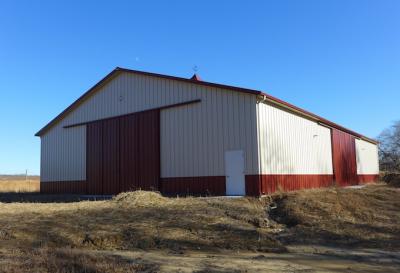Land Trust Barn Remains Empty a Year After It Was Built

A 5,888-square-foot barn on an over-10-acre piece of farmland owned by the Peconic Land Trust on Town Lane and Abraham’s Path in Amagansett was the subject of a public hearing by the East Hampton Town Planning Board on Jan. 10, although it is the focus of litigation against the Suffolk County Farmland Committee, which gave the trust approval to build the barn in 2016.
The East Hampton Town Building Department, which issued a building permit for the barn on Aug. 15, 2016, had issued a stop work order that November, just before the barn was completed, saying it would not be able to provide the trust with a certificate of occupancy until it obtained site plan approval from the planning board. The barn had sat, unused, ever since, although the trust applied to the board for site plan approval on March 23, 2017. The Jan. 10 hearing was to be one of the final steps in the process.
The property is part of a much larger farmland tract donated originally by Deborah Ann Light that includes Quail Hill Farm. The county gave the parcel to the Peconic Land Trust and then bought the development rights from the trust for $6 million. The trust leases the land to small farmers, with Balsam Farms and its popular farm stand on the southwest corner of the property and Amber Waves in the vicinity.
The delay in site plan approval was prompted by a December 2016 lawsuit launched by a neighbor, Fouad Chartouni, who brought suit following a September 2016 decision by New York State Supreme Court Justice Thomas F. Whelan in a lawsuit by the Long Island Pine Barrens Society against the county. That decision, which is being appealed, included a ruling that the purchase of development rights by the county precludes the construction of barns, greenhouses, and other farm structures.
Even were such construction eventually deemed legal, however, Mr. Chartouni objects to the barn’s location, holding that it is too close to his property.
At the Jan. 10 site plan hearing, Linda Margolin of Margolin Besunder, who represented Mr. Chartouni, launched several complaints about the location of the barn, saying a much better site was behind an existing Balsam farm stand and arguing that the surveys presented to the board were not of the required scale for site plans. She also told the board that she was the attorney who brought the suit against the county’s approval of the barn on behalf of Mr. Chartouni, calling its approval “arbitrary and capricious.”
Dina DeLuca Chartouni, Mr. Chartouni’s wife, was among those who spoke at the hearing. She said that she and her husband were extremely supportive of farmers, but that the barn looms over her property and gleams in the sun.
Eric Schantz of the East Hampton Town Planning Department, who had told the board in an initial assessment of the barn’s location that it was well screened from the road, said at the hearing that in fact it did appear visible from the Chartouni residence.
Scott Chaskey, the director of the nearby Quail Hill Farm, told the board it was essential for farmers to store equipment indoors, rather than letting tractors and equipment rust.
“A barn has been needed for 15 years,” he said. He had started Quail Hill Farm with a single hand tiller, he said, and it now owns six tractors, which sit outside in the rain and snow. The location of the barn, he said, was its “logical place.”
Among farmers at the hearing, Gregg Kessler also spoke in favor of the barn, saying Mr. Chartouni would object to any location, while an Amagansett man, Alexander Peters, said the land trust had used “Gestapo-like tactics” in getting the barn built, because there had been no community participation.
Rick Whalen, the attorney representing the trust, said the board could consider approving the site plan despite the lawsuit by Mr. Chartouni. If that decision were to go against the land trust, the barn would have to come down, he said, but he argued that should not affect the planning board’s decision. John Jilnicki, attorney for the board, seemed to agree with that point of view.
Mr. Whalen continued his argument in favor of site plan approval by telling the board that the placement of the barn had been carefully chosen, was well screened, and had been placed where the soil is not as suitable for farming as other areas on the property. He called Ms. Margolin’s comments about the scale used in the surveys “nonsense.”
The hearing was closed by the five members considering the matter. Ian Calder-Piedmonte, a partner at Balsam Farms, had recused himself, and the board is minus a seventh member since Diana Weir’s term expired at the end of 2017.
